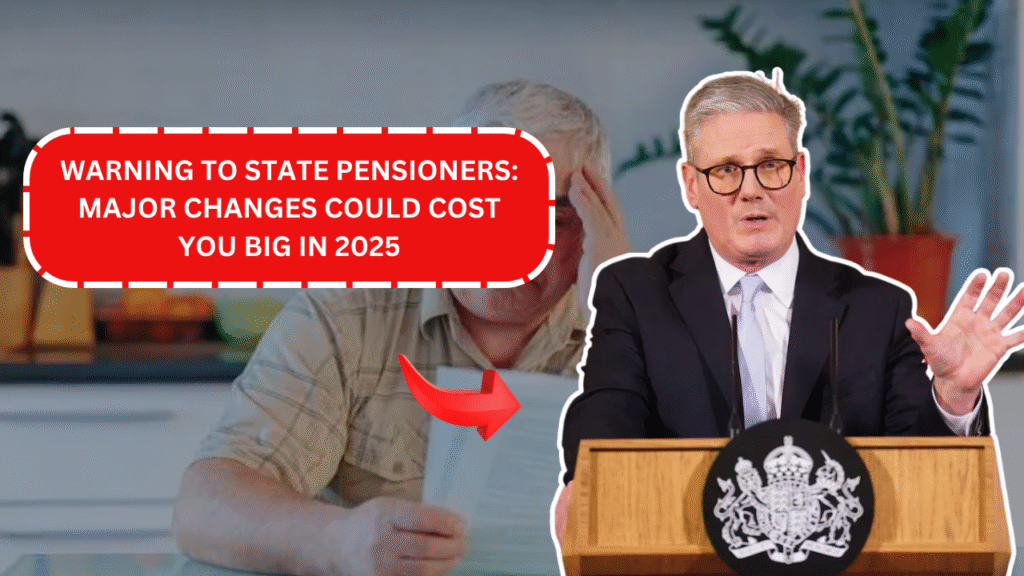In recent developments, millions of single state pensioners in the UK have been issued a major warning from the Department for Work and Pensions (DWP) regarding potential tax liabilities and pension payment issues. The warning addresses the risk of unexpected tax bills and highlights critical issues that could affect pensioners’ financial wellbeing in the coming years. The situation stems from changes in government policies and administrative errors, leaving many pensioners vulnerable to financial shocks.
The Risk of Unexpected Tax Bills
A significant concern for single state pensioners is the looming threat of unexpected tax bills. The UK’s personal income tax allowance has been frozen at £12,570 since 2021. While this may seem like a modest figure, combined with the increases in state pension payments, many retirees are now finding themselves pushed into taxable income brackets. This is particularly true for those who rely on their state pension as their primary source of income.
The full new state pension, which is currently £230.25 per week, adds up to approximately £11,973 annually. When this is combined with other forms of retirement income, such as a modest private or workplace pension, many pensioners find that their combined income exceeds the personal allowance threshold. This means that they are now liable to pay income tax, even though they did not expect to do so.
For many retirees, the state pension increase under the “triple lock” system, which ensures that the pension rises by at least 2.5%, has compounded the issue. This increase, while beneficial for some, has inadvertently pushed many pensioners into higher tax brackets, with more retirees expected to pay taxes in the coming years.
Experts predict that by 2027, nearly 18 million people could be paying income tax, with a significant portion of them over the age of 60. This development highlights the importance of planning ahead and ensuring that pensioners are prepared for the financial impact of these changes.
State Pension Underpayments: A Hidden Crisis
Alongside concerns about tax liabilities, single state pensioners are also grappling with a significant underpayment issue. Recent investigations have revealed that approximately £804 million in state pension payments have been underpaid to over 130,000 individuals. This issue primarily affects married women, widows, and pensioners over the age of 80.
The underpayments stem from administrative errors, including failures to record National Insurance contributions correctly and not automatically adjusting pensions when a spouse retired. As a result, these individuals may not have been receiving the full amount of their entitlement, leading to financial hardship in some cases.
Pensioners affected by these underpayments are being urged to contact the DWP directly to find out if they are owed money. The DWP has acknowledged the problem and is working to rectify the situation. However, pensioners must remain vigilant and take proactive steps to ensure that they are not being shortchanged.
For more information on the underpayment issue and how to claim any missing funds, pensioners should visit the DWP’s official website.

Winter Fuel Payment Changes: A Financial Blow for Vulnerable Pensioners
In addition to tax issues and underpayment problems, pensioners are also facing changes to the Winter Fuel Payment, which is a benefit designed to help older individuals with heating costs. Starting from July 2024, the Winter Fuel Payment will be restricted to those who are in receipt of Pension Credit or other means-tested benefits. This change means that around 10 million pensioners who previously received this payment will no longer be eligible.
The Winter Fuel Payment, which has been a lifeline for many pensioners during the colder months, is being reduced as part of the government’s efforts to curb public spending. Critics argue that this decision disproportionately affects vulnerable pensioners who are already struggling with the rising cost of living.
Members of Parliament (MPs) and unions have voiced their concerns, emphasizing that this change will have a significant impact on pensioners’ ability to afford heating and manage their household expenses. For many, the loss of this benefit could exacerbate the financial challenges they are already facing.
For more information on the Winter Fuel Payment and how it may affect you, visit the Winter Fuel Payment section of the official government website.
What Pensioners Should Do Next
With so many changes affecting state pensioners, it is crucial for individuals to review their financial situation and take proactive steps to protect themselves. Pensioners should consider consulting a financial advisor to understand how these changes may impact their income and to explore strategies to minimize any potential tax liabilities.
Pensioners who suspect they are affected by underpayment issues should contact the DWP as soon as possible to ensure that they are receiving the correct amount. Additionally, those who rely on the Winter Fuel Payment should check their eligibility and be prepared for any changes in the coming months.
While these developments may seem overwhelming, staying informed and taking action early can help pensioners navigate these challenges and ensure that they are not caught off guard.
Conclusion
The recent warnings issued to single state pensioners by the DWP highlight significant changes that could have lasting financial consequences. With the possibility of unexpected tax bills, pension underpayments, and reductions in vital benefits like the Winter Fuel Payment, pensioners need to stay informed and take proactive steps to safeguard their financial future.









